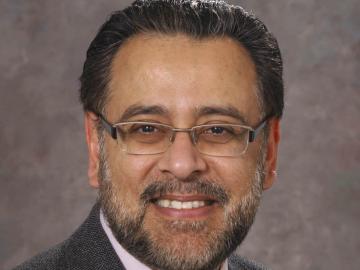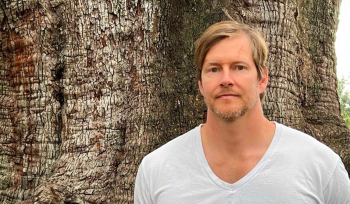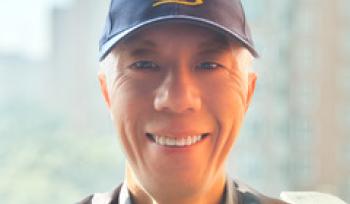COBE AlumRamit Lamba: Professor and Physician, UC Davis Health & UC Davis School of Medicine
“I have been a radiologist at UC Davis Health & School of Medicine since September 2004. I currently hold a couple of leadership positions, such as the Section Chief for the Division of Abdominal Imaging, which is the largest division in the Radiology Department, and the Associate Chair for Business in the Radiology Department- which is what initially triggered my interest in attending Berkeley Haas.”
“The business world has always been an interest of mine. I was at a stage in my career where I felt like I already had leadership roles, but was also at a point where I wanted to learn more.”
Building and Executing Strategy is a Missing Skill for Many Physicians
“Physicians are very good at taking care of people but are generally not trained in understanding the operations of a business. They tend to be change-averse and sometimes resistant to learning about fields outside of medicine. In contrast, the business world focuses a lot on dynamic leadership, change, nimbleness, and strategy.”
“Going into the Berkeley Executive Education Program, “strategy” was just a generic term to me. Examples of ‘strategy’ included things such as: ‘this is my strategy to prepare for an exam’, or ‘this is my strategy in dealing with a difficult situation’. Taking the executive education programs at Berkeley Haas gave me not only a better understanding of organizational leadership, but also what strategy means in the context of a business, it's importance, why we need to learn it, and also illuminated how physicians sometimes lack the skills of building and implementing strategy in their practice environments.”
“Several physician groups that I know work without developing a sound strategic plan, and while physicians are very mission oriented, and protocol driven, they tend to be slower at innovation, or responding to the changing economic forces in the world around them.”
“In medicine, just like in business, the marketplace is very competitive. For example, in the Sacramento region alone, there are at least five major medical groups that provide healthcare for the community. They tend to “compete” with each other, even though we all have the common mission of caring for the sick. These diverse groups would serve the community better if they adopt strategies to provide distinguishing value propositions for their stakeholders.”
“Developing a strategy for your practice is a good start, but there's a huge component of how you execute it. My time at Berkeley Executive Education has helped me realize how important it was for me to get out of my current mindset and grow my understanding of business and leadership. Completing the Certificate of Business Excellence (COBE) Program at Berkeley thus has helped me immensely. I realized that just like medicine is a structured science, business is a structured science and to be an effective leader, it must be learned."
Why Berkeley Executive Education?
“The Berkeley Executive Education program, particularly the Certificate of Business Excellence, interested me because world-renowned Haas Professors teach it, and Berkeley has a brand presence and a reputation that is hard to match. Berkeley Haas consistently ranks among the top 10 business schools in the country. It has fueled innovation in Silicon Valley. The reputation is just amazing.”
“The other thing that attracted me to Berkeley Executive Education was their philosophy and the four pillars around which the Executive Education programs and COBE are structured. The pillars include Strategy & Management, Leadership & Communication, Entrepreneurship & Innovation, and Finance & Business Acumen. Within each pillar, are multiple program offerings with flexibility in choosing programs that match an individual’s interest, yet allowing you to finish the certificate program in 3 years by completing a minimum of 17 program days. Berkeley Executive Education is one of the few places where you can build such a personalized education experience. Before choosing Berkeley, I compared it with other business executive programs such as Harvard, Wharton, and Stanford. Choosing Berkeley Executive Education was thus a no brainer for me. Additionally, months after my COBE completion, I still refer to my Berkeley notes and continue to build my knowledge with the additional readings suggested at the course. The learning hasn’t stopped for me!”
Health systems need to invest in developing future leaders, and I believe Berkeley has great offerings to do this. Investing in the growth and development of its people is the highest return on investment for an organization.
Gaining a New Leadership Outlook
“Before attending Berkeley Executive Education, I had a narrower view of leadership. To me, leaders were people you saw in the news…our politicians, CEOs of big companies, or people working in C-suites. In the time that I spend at Berkeley, meeting a diverse group of people from different industries, who were engaged in varied leadership roles, made me realize that most leaders are not necessarily people working at the top of their organizations.”
“For a long time, I felt leadership required having a role. But, I have learned that it's about making a difference, empowering others, being a mentor and a guide to others in your organization and doing all of this with great humility. It's all about what you do for others.”
“You can identify leadership opportunities anywhere you are, and you can define leadership in any setting. I realized that leadership happens every day and in every role. Leadership is a lot about helping others and learning from each other. Being and stating your vulnerability are important skills that leaders need to learn, and this was reinforced in the Berkeley Executive Leadership program. Finally, you don’t need to have a defined or stereotyped leadership style. You need to learn and practice multiple leadership styles, that are adaptive to different situations. In doing so you will develop into an authentic leader. For me, going through the program was a shift in my mindset.”
Adopting the Berkeley Culture
“The Berkeley Haas School of Business has a culture centered around their four Defining Leadership Principles: Question the Status Quo, Confidence Without Attitude, Student Always, and Beyond Yourself. These principles strongly resonated with me. It sums up the learning culture at Haas and Berkeley Executive Education, and it influences the leaders it produces.”
“These are not just inspirational words on their website or a group of words inscribed on the top of the front building as you enter Haas. These probably end up becoming personal guiding principles for many aspiring leaders, and they have certainly become firmly etched in my brain.”
“I finished my program with a twinge of sadness of leaving this wonderful place of scholarship and learning, but took comfort in the knowledge that I was connected with a great network of alumni who I could always learn from.”



